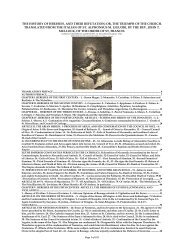The Writings of St. Francis of Assisi - + Saints' Works
The Writings of St. Francis of Assisi - + Saints' Works
The Writings of St. Francis of Assisi - + Saints' Works
Create successful ePaper yourself
Turn your PDF publications into a flip-book with our unique Google optimized e-Paper software.
THE WRITINGS OF ST. FRANCIS OF ASSISI<br />
with the plea "for the love <strong>of</strong> God." (Legenda Maior, Chap. I, No. 1) Divine grace completed in<br />
him the work <strong>of</strong> nature and brought him to the highest perfection. Having on one occasion<br />
refused alms to a poor man, he forthwith repented and felt impelled to go and seek him out so<br />
that by the very abundance <strong>of</strong> his charity he might succor this man in his poverty.<br />
On another occasion he was with a party <strong>of</strong> young men, singing in the streets after a gay<br />
banquet, when he stopped suddenly and, as if lifted outside himself by a wonderful vision, turned<br />
to his companions who had asked him if he was thinking <strong>of</strong> getting married and quickly replied,<br />
with some warmth, that they had guessed rightly because he proposed to take a spouse, and no<br />
one more noble, more rich, more beautiful than she could possibly be found, meaning by these<br />
words Poverty or the religious state which is founded on the pr<strong>of</strong>ession <strong>of</strong> poverty. In fact, he<br />
had learned from Our Lord Jesus Christ Who, "although he was rich made Himself poor for us"<br />
(II Corinthians viii, 9) that we, too, should become rich by His poverty, which is, in truth, divine<br />
wisdom; a wisdom which cannot be overthrown by the sophistries <strong>of</strong> human wisdom, a wisdom<br />
which alone can renew and restore all things. For Christ has said: "Blessed are the poor in spirit;<br />
if thou wilt be perfect, go, sell what thou hast, and give to the poor, and thou shalt have treasure<br />
in heaven: and come follow me." (Matt. v, 3, and Matt. xix, 21)<br />
Poverty, which consists in the voluntary renunciation <strong>of</strong> every possession for reasons <strong>of</strong><br />
love and through divine inspiration and which is quite the opposite <strong>of</strong> that forced and unlovable<br />
poverty preached by some ancient philosophers, was embraced by <strong>Francis</strong> with so much<br />
affection that he called her in loving accents, Lady, Mother, Spouse. In this regard, <strong>St</strong>.<br />
Bonaventure writes: "No one was ever so eager for gold as he was for poverty, nor more jealous<br />
in the custody <strong>of</strong> a treasure than he was <strong>of</strong> this pearl <strong>of</strong> the Gospel." (Legenda Maior, Chap. VII)<br />
<strong>Francis</strong> himself, recommending and prescribing for his followers in the rule <strong>of</strong> his Order the<br />
exercise <strong>of</strong> this virtue in a very special manner, manifested the high esteem he had for poverty<br />
when he wrote these expressive words: "This is the sublimeness <strong>of</strong> the highest poverty which<br />
made you, my dearest brothers, heirs and kings <strong>of</strong> the Kingdom <strong>of</strong> heaven, which made you poor<br />
in things <strong>of</strong> this world but enriched you with all virtue. This should be your heritage; to which,<br />
giving yourselves up entirely in the name <strong>of</strong> Our Lord Jesus Christ, nothing else will you desire<br />
forever under heaven." (Rule <strong>of</strong> Friars Minor, Chap. VI)<br />
<strong>The</strong> reason why <strong>Francis</strong> particularly loved poverty was because he considered it a special<br />
virtue <strong>of</strong> the Blessed Virgin, and because Jesus Christ on the Cross, even more especially chose<br />
poverty for His spouse. Since then poverty has been forgotten by men and has appeared to the<br />
world both irksome and foreign to the spirit <strong>of</strong> the age.<br />
Often when thinking <strong>of</strong> these things, <strong>St</strong>. <strong>Francis</strong> used to break down and shed bitter tears.<br />
Who would not be moved at this spectacle <strong>of</strong> a man who was so much in love with poverty that<br />
he appeared to his former boon companions and, to many others besides, bereft <strong>of</strong> his senses?<br />
What are we to say then <strong>of</strong> the generations following him which, even if they are very far from<br />
an understanding and practice <strong>of</strong> evangelical perfection, yet are filled with admiration for so<br />
ardent a lover <strong>of</strong> poverty, an admiration that is continually on the increase and which is<br />
particularly noteworthy in the men <strong>of</strong> our own day? Dante anticipated this admiration <strong>of</strong><br />
posterity in his poem "<strong>The</strong> Nuptials <strong>of</strong> <strong>St</strong>. <strong>Francis</strong> and Poverty," in which poem one finds it<br />
difficult which to admire more, the remarkable sublimity <strong>of</strong> the ideas expressed or the beauty and<br />
elegance <strong>of</strong> the style. (Paradiso, Canto XI.)<br />
<strong>The</strong> high ideals and generous love <strong>of</strong> poverty which possessed the mind and heart <strong>of</strong><br />
<strong>Francis</strong> could not be satisfied by a mere renunciation <strong>of</strong> external wealth. Could one ever succeed<br />
in acquiring true poverty, following the footsteps <strong>of</strong> Jesus Christ, if he did not make himself also<br />
poor in spirit by means <strong>of</strong> the virtue <strong>of</strong> humility? <strong>Francis</strong> well understood this truth; he never<br />
Page - 9













